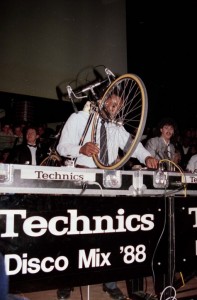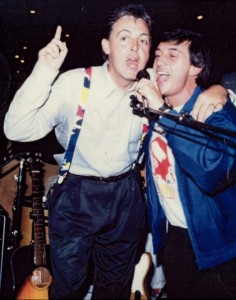Don’t ever judge a book by its cover. There’s more to this man than merely playing the tourist and he certainly deserves the title of ‘big gun’. For all you budding disk jockeys out there take note, if it wasn’t for the man in the picture above, your wheels of steel may not be turning at such a rate. Tony Prince, founder and director of DMC could and should be considered one of the Godfathers of DJ culture. As creator of the world DJ Mixing Championships (launching careers of local DJs Cutmaster Swift and Chad Jackson in the process) and giving birth to ‘turntablism’, transforming the Technics SL1200/1210 turntable into a unique musicial instrument, the brand is still very much alive and kicking today. Cutting and scratching is the name of Tony’s game, let’s forget the rewinds for the time being.
Through DMC Tony has created a record label, magazine, infamous club night, exclusive mixes and merchandise aimed soley for the DJ community.
Originally starting out as a DJ and singer himself, he started to play DJ mixes on his show which had been submitted by people from all over the world. From this, Tony invented the word ‘megamix’ to describe the art of mixing records in a non-stop medley. From there he gave them the opportunity to produce these mixes and release them on what was the first DJ only record label. The infamous Mixmag and Update magazines spawned as a result and there were even excursions abroad to the clubbing island of Ibiza way back in 1986!
Now boasting offices in London, New York and Slough, the latter its original home, DMC can be proud of what it has achieved in the music world, playing ambassador to all DJs and what they stand for. Time to dig in the crates…
DMC were one of the founding fathers of the DJ culture back in the 80s, tell us more about the company in general.
It all began with a humble cassette. Back then I was a DJ and Programme Director for Radio Luxembourg and apart from doing my own shows, I also employed new DJs when the current ones had left, usually for Radio 1. They would send me scores of audition tapes each week and I’d listen to them religiously because I too had once sent tapes all wrapped up in hope. This tape however was different, the DJ didn’t speak! A few weeks after receiving it, I decided to listen again in my car driving home and it suddenly grabbed me, he was mixing in rhythm, in tune from one funky hit to another.
The kid came from Wales, Alan Coulthard was the name and he wrote occasional columns for Record Mirror. I asked him to do a weekly mix on my ‘disco programme’ and we then shaped up to doing one artist mixes which we termed megamixes. Other DJs then started to send me their creations, very few were mixing live in the clubs back in 1981/2 and I started to receive letters from DJs who wanted to know how they could get hold of these mixes to play in their venues. I started using these mixes at my Radio Luxembourg live gigs around the country. In Ireland, one promoter refused to pay me, “I booked Tony Prince not a f****** jukebox” he cursed.
How did you get the idea to start the company initially? Who or What inspired you?
I had lunch with Maurice Oberstein, the Chairman of CBS (now Sony) and the head of the BPI, the authority who looked after all the record labels. As Programme Director of the most powerful commercial radio station in the world, label owners usually bought me lunch, this time I was buying.
“If I could sell these mixes to DJs exclusively, I could promote your priority releases for free”, I enthused to ‘Obie’. “No mail out costs for you, no maintaining a club promotion department and as I’ll be sending preview copies in an edited format, the DJs will actually buy the 12? version they like and what they hear on the club mail out!”
Within a week, myself and my wife Christine were wheeled in to a BPI committee meeting where I put my proposal to them. In December 1982 my whole family spent the Christmas holiday packing special promotional cassettes to every DJ and Club owner in the country. I went to Slough Library and copied all their addresses down from the national Yellow Pages. I put a full page ad in Music Week letting all the labels know our intentions and how we were about to change the nature of record promotion.
By February 1st we had a couple of hundred members. We’d sent them a terrific cassette of mixes then a further cassette crammed with previews of forthcoming releases. I decided to send them a newsletter, a 16 page black and white magazine entitled Mixmag. The Disco Mix Club was born.
The DJ Mixing Championships are still going strong. Tell us more about the competitions.
The DMC DJ Mixing Championships was a natural evolution from studio and club mixing. We had a convention at Peter Stringfellow’s brilliant new London venue, The Hippodrome. We had 1200 DJs there that Sunday evening and Whitney Houston made her world-first appearance. On the programme was a mixing competition but it was more to see how many tracks a DJ could play in a minute.
We then got things off the ground with our first ‘real’ DJ Mixing contest and the following year, American hip-hop legend DJ Cheese won with the first ever scratch set. We also hosted a night at The Royal Albert Hall and the whole thing took off big time, next it was Wembley Arena which managed to attract 11,000 DJs and fans!
Any particular favourite memories for the DMC crew over the years?
Too many great memories, lots of laughs too. Mixmag taking off and finally selling 150,000 copies each month which was rather daunting! Due to the success of the magazine, EMAP and IPC started bartering for the title and we had to let it go. By this time it had become the bible for club culture and had launched the success of Cream, Renaissance, Manumission, Ministry of Sound and the careers of Paul Oakenfold, Sasha and Digweed. Even Carl Cox came from the womb of DMC’s championships.
The greatest achievement was to make DJs far and wide into mix disciples, becoming international. Any DJ could now be the recipient for a record label’s pre-release, where as once, due to economies involved in club promotion, it could only be a select few. We were of course providing clubs (via their DJs) with music that their audiences couldn’t buy and could only be heard if they went to that particular club. This put the power into the hands of our member DJs. It was all good, good, good.
What do you think of the recent arrival of laptop DJing, ie Serato and the like? Are you still more pro-vinyl?
Vinyl has a far better sound than digital but we’re testing the water now and allowing limited technology in the live championships. We’ve now extended that with our new Online DJ Championship in order to let the DJ creativity go where it can go; to limit the width of what they can and can’t do will kill the art. Having said that, we will always maintain a pure vinyl event in The Battle For World Supremacy but the main event gives them 6 minutes to do whatever they wish. Serato and Rane are our sponsors this year and we have a number of sponsors for the online event who, like us, are fascinated to see where the DJs are heading.
In regard to the DMC Championships, any particular favourite DJ performances over the years? Any names we should be looking out for in the future?
Take a look at Fung Fung in the Online event. He’s used a blue-screen technique and a mask so it looks like Homer Simpson is doing the mix. First it’s absolutely hilarious, second he’s very good. Over the years, iconic DJs have included Cash Money (Philadelphia), Q-Bert (San Francisco) and Craze (Miami) but the teams, C2C from France and the Japanese crew Kireek have taken the art to new places.
Talking of the future, you’ve achieved much for the art of turntablism, what does it hold?
An old folks retirement home I should think! We have such a great reputation, everyone knows our heart beats for the DJ. We just have to make sure we continue to serve them well and come to terms with this fast moving world we’re now investing in. It’s exciting, there are so many opportunities for everyone.
There is also the infamous DMC record label. Tell us more about the general history and what you have planned.
We started DMC Records through Arista and had the world’s first club DJ remix hit with Tina Charle’s I Love to Love. I even dragged Sally (who now runs the DMC Championships) into the studio to make Golden Ruleswhen she was 6! Later, we started the Stress Record label with artists such as Brothers in Rhythm and John Digweed. In fact, the aforementioned produced Kylie Minogue in our studio after she left SAW, out of which came Confide in Me. Both Dave Seaman and Steve Anderson had come to us years earlier as rookie DJs. They are both megastars today.
Our studios were built for DJs to expand their talents. Firstly there was club mixing and megamixing. Next up was a progression to full-on 24 track remixing resulting in the DJ as an artist. We had Les LA MIX Adams, Chad Jackson, Paul Dakeyne who did the Sigue Sigue Sputmix and many other incredible remixes. Alan Coulthard did the original Michael Jackson megamix which, believe it or not, we were asked to do to help to promote his album Thriller!
There are so many fond memories associated with the label. Sanny X did a full remix commissioned by Rocket Records of Elton John and Milly Jackson’s Act of War. It was knocked back by Elton because Sanny had only used Milly’s vocals! I asked Sanny why and he answered “Because Milly is a better singer!” (Sanny’s Swedish/Greek, a bit of a mixed up kid!). Then Adam Ant knocked us back on a mix “Because he didn’t like you f****** about with his voice!” and George Michael told his fans not to buy the Club Fantastic Mix which we’d been commissioned to do by his old label Innervision. Really, the tracks we were given to mix were basically unmixable, bad bed partners as they say but the money was good and it was a George Michael/Wham release so we did the best we could.
We had to get the artists used to DJs messing with their music and that’s the major pioneering DMC did. They can’t release anything now without a DJ putting his fingerprints on it! One member of Deep Purple once suggested to me that all DJs are parasites. I’ve spent my entire life trying to prove him wrong…
You also started one of the first DJ magazines with Mixmag. Tell us more.
We have maintained Update as a weekly for a number of years now. We tried to emulate Mixmag in the USA with Mixer which was doing fine until the Twin Towers went down. At that point American advertising went to the wall and we had to fold. We’re about to relaunch Update as DMC Magazine and the difference is it will also be a radio channel. Right now, we’ve re-stocked the DMC download site so everyone can buy single tracks instead of just the monthly DMC mixes and remixes. We’re going to make this into the most exclusive download site in the world and I hope that all the Beat readers will come and investigate. All sales will see 30% going right to the record label/artist and of course there’ll be music there you won’t ever be able to buy on iTunes!
You were also behind theBack to Mine DJ mix series, tell us more about that. Do you have any plans to do more?
Pinnacle distribution folded and with it our annual advance which allowed us to pay out for the Back to Mine artists and tracks, it’s very expensive at that level. We retired the series but are now going to give it a massive rebirth on the DMC download site. We’ve been doing a ‘print only’ series of Back to Mine by top club DJs for about 8 years and we have in fact amassed no less than 350 which will appear as an archive in DMC Magazine and played as a programme on DMC Radio.
The great thing about Back to Mine of course is these are tracks chosen by people who live, love and make music and it’s always been fascinating to know what music by other artists they’d play for you after the gig back at their place with a nice drop of wine. Their two-sentence description of why they have chosen each track really makes you want to hear them. In the future you’ll not only be able to hear them immediately but you can also download the tracks you like and play them BACK AT YOURS!
Written for Beat Magazine circa 2011.
http://www.beatmagazine.co.uk/you-dont-have-to-run-to-be-dmc
© 2013 Pete Rann



